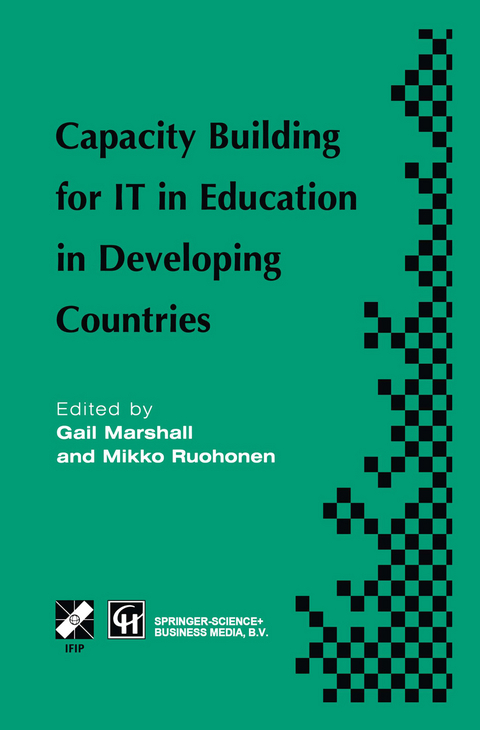
Capacity Building for IT in Education in Developing Countries
Chapman and Hall (Verlag)
978-0-412-81460-0 (ISBN)
I National Perspectives.- 1 Nordic cooperation on communication and information technologies and didactics in education.- 2 Building resource capacity for IT education and training in schools — the case of Botswana.- 3 Computer education and human capacity for information technology in Namibia.- 4 Schools with SPIRIT — capacity building in The Netherlands.- 5 Information technology in Norwegian education — consistency of strategic initiatives implementing IT in primary education.- 6 Development of information technology in Hong Kong education over the past decade.- 7 Fighting a lone battle for computer education in Nepal.- II Building Skills in the National Context.- 8 Bridging the skills gap in Zimbabwe.- 9 Information technology education and training initiatives — the Nigerian experience.- 10 Using applications programs in a university to build human capacity for information technology.- III Targetted Projects.- 11 Infrastructure issues for implementation of portable computer use in schools.- 12 Capacity building with a difference.- 13 Principals, information technology and leadership — coping with professional development despite isolation.- 14 ‘Communicate and Learn’ — a collaborative project.- 15 The effect of network technology on education.- IV Classroom-based Initiatives.- 16 Technology and young children — new strategies to prevent illiteracy and create better chances of success for all.- 17 Designing Logo-based microworlds for effective learning — a road to improving teacher education.- V Research for IT-based Education.- 18 The needs and challenges of information systems education — the case of Nigerian universities.- 19 Blarne the technocentric artefact! What research tells us about problems inhibiting teacher use of IT.- 20 Measuringsuccess in the global village — resources for conducting systematic and comprehensive evaluations in IT settings.- VI Resource acquisition, allocation and utilization.- 21 The role of educational and professional bodies in guidance towards capacity planning.- 22 The European computer driving licence.- 23 Information literacy — the missing link in education, with special reference to developing countries.- 24 Maximizing the benefits of aid for information technology.- 25 Building capacity for information technology in educational management in developing countries.- 26 Information technology resources for education in developing countries.- VII A Curriculum for the Future.- 27 The need for a new perspective — creating learning networks for African teachers: change, professional development and ICTs.- 28 Informatics for secondary education — the UNESCO/IFIP curriculum as a resource for developed and developing countries.- VIII Workshop Presentations.- 29 Teaching informatics as a subject.- 30 Using hypermedia and the internez in the teaching of mathematics.- 31 Information technology and problem solving in mathematics education.- 32 Appropriate research in IT in emerging countries.- IX Discussion Group Recommendations.- Discussion Group 1 — IT in curriculum and courseware development.- 34 Discussion Group 2 — Policies, strategies and initiatives of ICT in education.- 35 Discussion Group 3 — Guidelines and directions for ICT policy in education.- 36 Discussion Group 4 — IT education delivery and learning.- 37 Discussion Group 5 — Information technology in institutional administration and management.- 38 Discussion Group 6 — Building resource accessibility in developing countries.- Alphabetical List of Participants.- Index of Contributors.- Keywordindex.
| Erscheint lt. Verlag | 28.2.1998 |
|---|---|
| Reihe/Serie | IFIP International Federation for Information Processing |
| Zusatzinfo | XIV, 360 p. |
| Verlagsort | London |
| Sprache | englisch |
| Maße | 155 x 235 mm |
| Themenwelt | Schulbuch / Wörterbuch ► Unterrichtsvorbereitung ► Unterrichts-Handreichungen |
| Mathematik / Informatik ► Informatik ► Theorie / Studium | |
| Informatik ► Weitere Themen ► Hardware | |
| Sozialwissenschaften ► Pädagogik | |
| ISBN-10 | 0-412-81460-9 / 0412814609 |
| ISBN-13 | 978-0-412-81460-0 / 9780412814600 |
| Zustand | Neuware |
| Haben Sie eine Frage zum Produkt? |
aus dem Bereich


